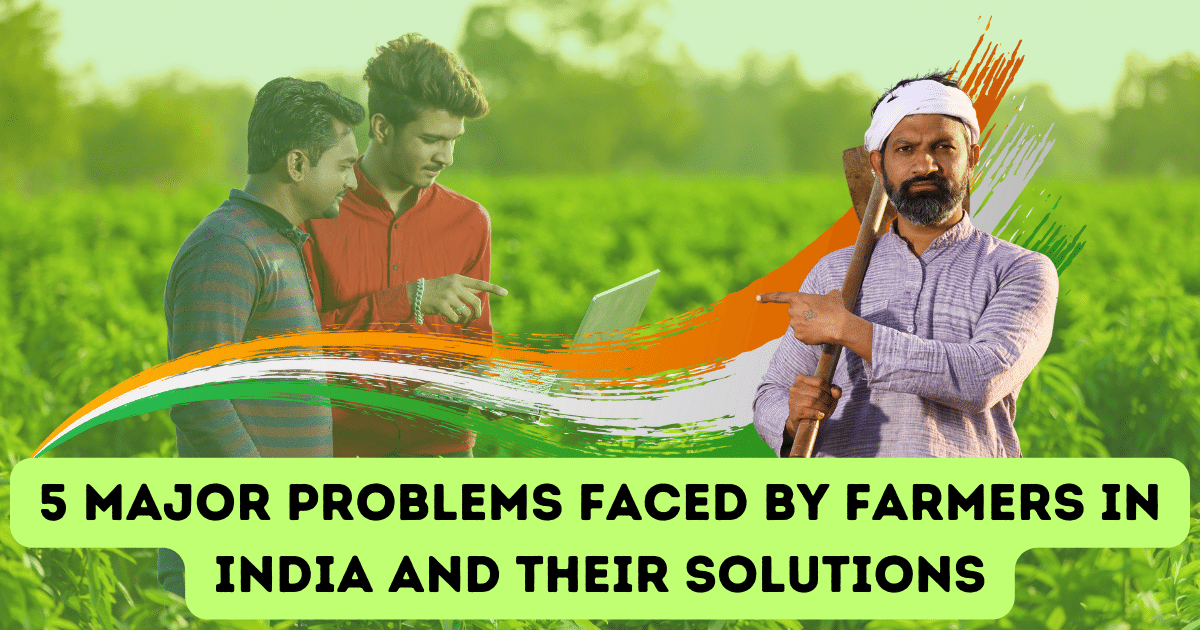Introduction
The agricultural sector in India, which is frequently seen as the backbone of the country’s economy, is confronted with numerous difficulties that put millions of farmers’ livelihoods at risk. These difficulties include poor soil health, ineffective irrigation techniques, restricted access to markets, and restricted availability of information and technology. In this thorough investigation, we explore the complex issues Indian farmers face and offer long-term solutions for each one.

1. Limited Access to Information & Technology
Problem:
Farmers struggle with a lack of access to modern technologies and important agricultural information, especially those who work in rural areas. This limits their ability to maximize output, improve productivity, and adjust to changing farming conditions.
Solution:
- Provide complete agricultural services that include training, technical assistance, and accurate, timely information.
- Use digital channels, such as websites and mobile apps, to spread knowledge about market trends, weather forecasting, and crop management.
- Encourage the sharing of knowledge and provide access to affordable contemporary technologies in order to close the technological gap and improve farming methods.
2. Restricted Market Access
Problem:
Farmers’ profitability and ability to maintain an economy are frequently put at risk due to their limited access to markets, vulnerability to market fluctuations, and difficulty locating opportunities for extra value.
Solution:
- To give farmers greater influence in negotiations and improved market access, establish farmer-producer groups and cooperatives.
- To increase farmers’ revenue generation, encourage value addition, post-harvest management techniques, and the development of agricultural processing facilities.
- To ensure stability and financial security for farmers, make it easier for them to access financial services, insurance, and credit that are suited to their needs.
3. Degraded Soil Health & Fertility
Problem:
Soil erosion, nutrient deficiencies, and declining quality of soil are common problems that have an impact on crop growth and the long-term sustainability of agricultural systems.
Solution:
- To improve the fertility and health of the soil, encourage sustainable soil management techniques including cover crops, crop rotation, and organic farming.
- Organize comprehensive farmer education initiatives covering soil testing, appropriate nutrient management, and balanced fertilization techniques.
- Make investments in agriculture and contour farming as soil conservation techniques to reduce erosion and guarantee sustainable land use.
4. Inefficient Irrigation & Water Management
Problem:
Significant obstacles include water scarcity and inefficient irrigation techniques, which result in water waste, lower production of crops, and environmental damage.
Solution:
- Use water-efficient irrigation methods, like drip irrigation and precision sprinklers, to reduce water loss and maximize water consumption.
- To improve water management, promote water-saving techniques like rainwater harvesting and water recycling.
- Promote the use of water-efficient crop varieties and offer thorough instruction on irrigation scheduling to optimize produce while preserving water resources.
5. Ineffective Pest & Disease Management
Problem:
Conventional chemical-intensive methods put agricultural productivity at risk by causing pollution to the environment, health risks, and pesticide resistance.
Solution:
- Promote integrated pest management (IPM) techniques, focusing on the sustainable control of pests and diseases through the prudent application of agricultural pesticides and biological control techniques.
- Encourage the role of beneficial insects and birds, which are natural enemies of pests, in preserving ecological balance.
- By providing them with thorough training on pest identification, monitoring, and early intervention, you can raise farmers’ awareness and give them the tools they need to make wise decisions.
Conclusion:
An integrated and comprehensive approach is necessary to address the various issues that Indian farmers face. We can empower farmers, increase agricultural productivity, and guarantee food security for the country by combining knowledge dissemination, technology advancements, sustainable resource management, and better market access. Not only is the implementation of these solutions essential to the overall expansion and sustainability of India’s agricultural sector, but it is also vital for the welfare of the farmers who are the backbone of the country’s economy.

